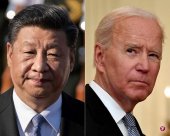The Ministry of National Defense released this year's defense report, focusing on the close cooperation between Russia's invasion of Ukraine, China and Russia, and the Taiwan Strait issue.The analysis pointed out that the Japanese government intends to pave the way to a significant increase in defense expenses with "military threat upgrades".
At the cabinet meeting on Friday (July 22), the Japanese government approved the Japanese defense white paper in 2022.
This white paper opened the chapter of "Russia's invasion of Ukraine", saying that Russia's behavior seriously violated international law.It says that Russia's invasion of blackness may send a wrong message, that is, "the intention of changing the status quo by force unilaterally is acceptable", which is worried about the security of Taiwan near Japan.
White Paper also warns that Moscow may rely on nuclear forces to play the role of obstacles, which means that the nuclear -related activities around Japan will increase, and the Russian nuclear submarine's activities near Japan are currently frequent.
Japan continues to emphasize the "Chinese threat theory", saying that "it is necessary to pay close attention to military cooperation between Russia and China", because this will lead to changes in military balance around Japan.
Talking about the increase in the Taiwan Strait's problem double
Japanese media analysis believes that this white paper is more obvious for China's strengthening of military strength than before.Samping news pointed out that the white paper uses the traditional expression of "strong security concerns", but it emphasizes that "this trend has become stronger in recent years."
The report said: "China takes nuclear and missile forces as its core, and its military power has increased rapidly in terms of quality and quantity."In addition, China uses advanced technologies such as artificial intelligence to try to establish a "world -class army".
Regarding the Taiwan Strait issue, the space of this white paper has doubled compared with last year, and it is discussed.Among them, mainland China occupies a favorable position in the military confrontation of Lu and Taiwan, and the United States should actively sell weapons to Taiwan.The conclusion of this part said: "The situation around Taiwan is related to Japan's security, and it is also important to the stability of the international community. On the issue of Taiwan, Japan hopes to solve peacefully through dialogue."
The content of this report caused a rebound in China.The Chinese embassy in Japan criticized the tone of the white paper negative negative, maliciously discredited the Chinese side, and interfered in China's internal affairs.
According to the official website of the Chinese Embassy in Japan, the spokesman for the embassy believed that the white paper "seriously violated the basic criteria of international relations and the spirit of the four political documents of China and Japan", and China expressed strong dissatisfaction and resolute opposition to this.
Japan commented that the cover of the white paper in 2022 was designed with "artistic sense" and soft, but the content emphasized that Japan must increase military reserve, and there was an unprecedented "strong soldier" color.The official hopes that by emphasizing the international situation of the Russian and Ukraine -related war and the surrounding military threats, the goal of the ruling party should increase military expenditure and increase the defense expenditure budget to 2 % of the GDP (GDP).
The white paper lists the comparison of defense expenses in Japan and many countries, highlighting that Japan's expenditure is too low.Compared with eight member states of Economic Cooperation and Development, Japan's military expenditure accounts for 0.95 % of GDP, 3.12 % in the United States, 2.57 % in South Korea, 1.2 % in China, and Russia 2.73 %.In the seven major industries, Japan's proportion is also the smallest.
Japanese Prime Minister Kishita Tianshio once said that 2 % of the military expenses accounted for the minimum standards of the GDP and the minimum standards of the North Atlantic Convention.Based on Japan's economic scale, if it increases defense expenses to 2 % of GDP, it will rise to the third place in the world, second only to the United States and China.


